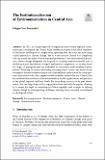Files in this item
The institutionalisation of environmentalism in Central Asia
Item metadata
| dc.contributor.author | Costa Buranelli, Filippo | |
| dc.contributor.editor | Sabyrbekov, Rahat | |
| dc.contributor.editor | Overland, Indra | |
| dc.contributor.editor | Vakulchuk, Roman | |
| dc.date.accessioned | 2023-04-14T15:30:08Z | |
| dc.date.available | 2023-04-14T15:30:08Z | |
| dc.date.issued | 2023-04-15 | |
| dc.identifier | 277113262 | |
| dc.identifier | 94411990-7d6f-4366-99a9-7cbf613b0bf4 | |
| dc.identifier.citation | Costa Buranelli , F 2023 , The institutionalisation of environmentalism in Central Asia . in R Sabyrbekov , I Overland & R Vakulchuk (eds) , Climate change in Central Asia : decarbonization, energy transition and climate policy . SpringerBriefs in climate studies (BRIEFCLIMATE) , Springer , Cham , pp. 137-148 . https://doi.org/10.1007/978-3-031-29831-8_11 | en |
| dc.identifier.isbn | 9783031298301 | |
| dc.identifier.isbn | 9783031298318 | |
| dc.identifier.issn | 2213-784X | |
| dc.identifier.other | ORCID: /0000-0002-2447-7618/work/133187075 | |
| dc.identifier.uri | https://hdl.handle.net/10023/27402 | |
| dc.description.abstract | In 2021, in a largely ignored yet significant step towards regional coordination and convergence, the Central Asian republics took part in the 26th Conference of the Parties in Glasgow as a single entity, speaking with one voice and advocating a joint approach to climate change. Yet, to what extent is Central Asia complying with the norms and rules of environmental governance? Are environmental protection, climate-change mitigation and the push for an energy transition merely a set of shallow practices and rhetoric to signal performative compliance, or are they based on a logic of appropriateness and embedded in a normative understanding of green politics? Drawing on recent scholarship on international society and based on the assumption that environmentalism is now an established institution of the contemporary international order, this chapter considers whether, and in what way, Central Asia has embraced the institution of environmentalism, exploring discourses and practices at the global, regional and local levels. Far from being an exercise in pure theorisation, this can help shape policy engagement from and with the region, allowing us to assess the depth of commitment of these republics and societies in fighting climate change by distinguishing challenges deriving from structural, instrumental or ideological factors. | |
| dc.format.extent | 12 | |
| dc.format.extent | 225013 | |
| dc.language.iso | eng | |
| dc.publisher | Springer | |
| dc.relation.ispartof | Climate change in Central Asia | en |
| dc.relation.ispartofseries | SpringerBriefs in climate studies (BRIEFCLIMATE) | en |
| dc.subject | Environmentalism | en |
| dc.subject | Institutionalisation | en |
| dc.subject | Central Asia | en |
| dc.subject | Climate change | en |
| dc.subject | International norms | en |
| dc.subject | GE Environmental Sciences | en |
| dc.subject | JQ Political institutions Asia | en |
| dc.subject | SDG 7 - Affordable and Clean Energy | en |
| dc.subject | SDG 13 - Climate Action | en |
| dc.subject | MCC | en |
| dc.subject.lcc | GE | en |
| dc.subject.lcc | JQ | en |
| dc.title | The institutionalisation of environmentalism in Central Asia | en |
| dc.type | Book item | en |
| dc.contributor.institution | University of St Andrews. School of International Relations | en |
| dc.contributor.institution | University of St Andrews. Centre for Global Law and Governance | en |
| dc.identifier.doi | https://doi.org/10.1007/978-3-031-29831-8_11 | |
| dc.identifier.url | https://doi.org/10.1007/978-3-031-29831-8 | en |
| dc.identifier.url | https://discover.libraryhub.jisc.ac.uk/search?isn=9783031298301&rn=1 | en |
This item appears in the following Collection(s)
Items in the St Andrews Research Repository are protected by copyright, with all rights reserved, unless otherwise indicated.

